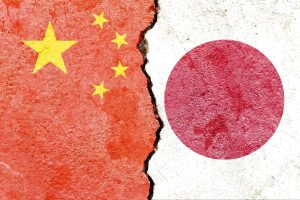In what has become a common occurrence in both the East China Sea and the Sea of Japan, Russian Il-38 information-gathering aircraft were found flying too close to Japan for Tokyo’s comfort, who scrambled fighter jets last week to intercept them. This came just hours after both Russian and Chinese vessels were crossing waters close to the Japanese islands of Okinawa and Miyako. Incidents like these are common, particularly after notable events. For example, in May, when Japan hosted Ukrainian President Volodymyr Zelenskyy at the summit of G-7 in Hiroshima, the same Russian Il-38 maritime aircraft was spotted along the Pacific Ocean and Sea of Japan.
For Japan, air and maritime intrusions into its territorial space are nothing new. China and Russia have been increasing joint military training and activities. At the Quad meeting in May 2022 in Tokyo, JASDF fighter jets were scrambled in response to both Chinese H-6 and Russian Tu-95 heavy bombers flying across the Sea of Japan. The number of violations of Japan’s air space has increased since 2020, with Japanese jets scrambling 778 times between April 2022 and the end of March 2023, and 1,004 times in 2021.
Sadly though, despite repeated diplomatic complaints to both Beijing and Moscow, little progress has been made. The issue for Japan is how to communicate its concern both assertively and effectively.
As recently as the end of July, Japan said it was aiming to improve its communications with China, with Chief Cabinet Secretary Hirokazu Matsuno reiterating the need to “build a constructive and stable relationship with China through mutual efforts,” particularly with China’s new Foreign Minister Wang Yi, and resolving to work on trilateral talks with South Korea. In a welcome development in March, the two sides established a hotline between defense officials in a bid to avoid accidental conflicts. This had been in the works since 2018, despite increased tensions in the East China Sea and in the space between the First and Second Island Chains. Despite a successful first 20-minute phone call in May, the effectiveness of the mechanism remains in doubt.
In geopolitics, the old adage “some things are better left unsaid” has an all-too-different meaning. Since the concept of a defense hotline was first explored in 2007 as a pillar of the Maritime and Aerial Communication Mechanism, it is striking that China’s defense or foreign affairs ministries are quiet on its promotion, as opposed to Japan, where the Ministry of Defense and the Ministry of Foreign Affairs have been much more vocal. And in Japan’s somewhat naive optimism, China could gain the upper hand, as the benefits of the hotline are much more important for Japan than they are for Beijing. Japan seeks the avoidance of conflict amid Chinese continued aggression in the region, and in the process, risks conditioning itself to an even more aggressive security posture by China. With each consecutive, yet meek warning via the hotline, China could push its “gray zone” activities further, knowing that Japan will ultimately press for avoidance, without serious consequence.
China has a clear record of choosing not to communicate when it suits its interests. The United States also experienced similar behavior. When U.S. Defense Secretary Lloyd Austin visited Tokyo in June, he lamented the fact that Chinese Minister of National Defense Gen. Li Shangfu refused to meet with him at the recent Shangri-La Dialogue in Singapore. Austin’s reasons were similar to Japan’s: “The provocative intercepts of our aircraft and also our allies’ aircraft, that’s very concerning, and we would hope that they would alter their action.”
While a hotline is likely necessary to maintain communication close encounters over air and on the sea, Japan must also take a sterner approach to incursions to avoid the impression that it is only concerned about conflict avoidance. China must understand that these activities could have dire consequences for friendly economic relations, as the incursions also impact other countries in the region, including South Korea. China, whose economy now has similar characteristics as 1990s-era, post-bubble Japan, cannot afford additional external shocks caused by economic sanctions. The United States briefly considered economic sanctions after Chinese reconnaissance balloons entered U.S. airspace.
Japan can consider itself lucky that bilateral ties with China have not reached the lows of the relations between Washington and Beijing. Biden’s weakness and vacillation on Taiwan have increased tensions, and the U.S.’ questionable commitment to Asian partners is less than reassuring. It’s no surprise that when China acts aggressively at U.S. interests in the Indo-Pacific, it is in partial response to a cacophony of anti-China opportunists in Washington, which make measured diplomatic progress increasingly difficult. Rationally, former Chinese Foreign Minister Qin Gang, responded to this messaging confusion by noting in a speech during the First Session of the 14th National People’s Congress in March, that “[America’s] ‘establishing guardrails’ for China-U.S. relations and ‘not seeking conflict’ actually means that China should not respond in words or action when slandered or attacked. That is just impossible!”
Instead, Japan should seek balance and consistency. Tokyo should use the hotline in tandem with public and private diplomacy efforts. While a closer economic relationship with Beijing should be strongly encouraged, a harder line on incursions with consistent messaging should permeate all relevant Japanese ministries. Interests in the development of a closer economic partnership with China must be tempered by assertive defense messaging both in public – and by phone.
































